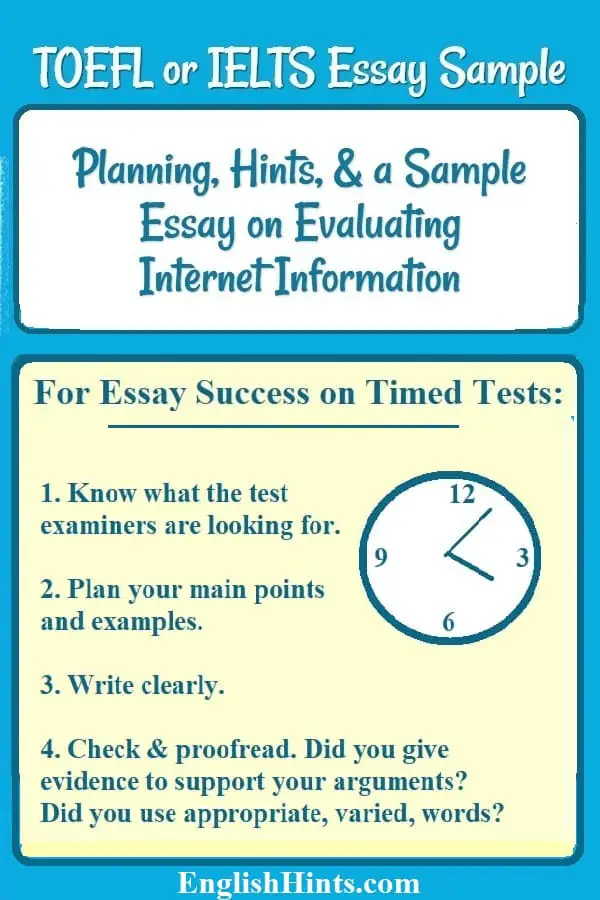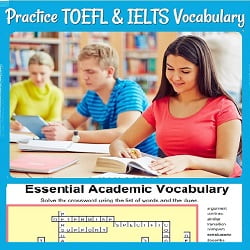TOEFL or IELTS Essay Sample
An IELTS essay is the second (and most important) part of the IELTS academic writing test. The TOEFL exam requires a similar second essay.
This page explains what the examiners are looking for in an IELTS or TOEFL writing sample (essay.) Then it gives an example of the quick essay planning you need to do. Finally, it shows a sample essay that would fit either TOEFL or IELTS requirements.
Either test may ask for various kinds of essays:
- comparing and contrasting two ideas or positions,
- arguing in defense of one side of an issue,
- evaluating the advantages and disadvantages (or positive and negative aspects) of a situation, or
- discussing a problem's causes and possible solutions.
IELTS and TOEFL examiners evaluate the essays using similar criteria. They look for good organization and writing, clear development of ideas, and varied, appropriate word choices.
They require at least 250 (IELTS)- 300* (TOEFL) words. IELTS allows about 40 minutes for its essay; the TOEFL, 30 minutes. (*The TOEFL exam suggests that a good essay will usually be at least 300 words. However, there's no penalty for fewer words if the answer is complete. You don't need to count words!)
For both essays, it's important to take a few minutes to plan, even though your time is so limited.
Planning will save you more time than it costs. It allows you to organize your thoughts and decide on your main points before starting to write. (Without planning you may discover half-way through that you need to change direction.) See the hints and sample outlines below.
The sample essay at the bottom of the page meets the requirements for either exam.
Planning your TOEFL or IELTS Essay
It’s worth taking a few minutes to roughly outline your paragraphs and main points.
(Save a few minutes at the end for proofreading as well. Check your spelling, punctuation, and grammar. Also, make sure that you have supported your thesis or main idea well.)
Below are two demonstrations of essay planning/outlining. They're responses to two different writing prompts.
(Your own notes can be even briefer, of course. Use any abbreviations that you’ll recognize as you write.)
I developed the outline for writing prompt 2 into the sample IELTS essay below the outlines. (The plan outlined for Prompt 1 became the gap-fill essay in Transition Words Practice. See Tony Hillerman's Navajo Detectives for an example of an essay analyzing a literary work.)
Two Example Outlines
TOEFL or IELTS Essay Outline, Example 1: “Online learning has more advantages than disadvantages.” To what extent do you agree or disagree? Give your reasons and specific examples to support them.
1. There are both advantages and disadvantages to O.L., but benefits outweigh drawbacks.
2. Disad. A: No face to face interaction.
Disad. B: Less opportunity to know fellow students.
3. Mitigating the disadvantages:
A. Videos of lectures, Skype, & online chat.
B. Can be reduced with icebreakers, self-intros, & adding time to socialize to the class schedule.
4. Advantages:
A. Avail to almost anyone who has a computer. Can be less expensive, esp overhead and texts/materials.
B. Can be designed to meet the needs of ss of varying learning styles and abilities. [Unlimited opportunities for review; types of presentation ltd only by tchr. imagination.] Accessible to students w/ physical disabilities that limit them in regular classrooms. [Adaptability of computers [TTS & vice versa, lg. print]
5. Summary. Point out it’s also possible to combine best aspects of both. Have occasional physical meetings (or video conferencing for classmates in several cities.) Use flipped classrooms, taped live lectures, etc.
Essay Outline Example 2 (see also the essay below): The Internet provides enormous amounts of information, good and bad. What are some ways Internet users can identify reliable information and avoid using poor-quality information to make decisions? Support your answer with relevant examples.
1. State the problem: lg. amts. of info. of varying value
2. Background of the problem
3. Possible solutions:
A. Look for authoritative sites
B. Check for possible bias
C. Compare information from several sites
4. Summary
Sample Essay: Evaluating Internet Information
The Internet has made information available to anyone who can type in a few simple search terms. The problem is that it also has large amounts of biased, outdated, and even false “information.”
Fifty years ago, finding facts about an uncommon medical condition or the world economy required a visit to a research library. Now almost any kind of information can be found online, usually free. Unfortunately, some of that information is not trustworthy. The old Roman warning “let the buyer beware” is more relevant than ever, even if no money is involved.
How can people ensure that the material they find is accurate and up-to-date? First, they can choose reputable websites. For example, government sites like the NIMH and professional medical sites like Web MD are authorities on health. There are trustworthy sites for alternative or less orthodox ideas as well. However, it is important to carefully examine authors’ credentials and arguments.
Information hunters also need to watch for evidence of bias and possible self-interest. Is the site pushing its own products or point of view, or selling for someone? Both are legitimate, but searchers need to be aware of the interests involved.
They should also check the opinions or facts of several different authorities. If two or three authoritative sites agree, the data should be trustworthy. If the material seems controversial or contradicts common sense, investigate it further.
Searchers can compare the evidence, arguments, and credentials of the opposing sides to decide which (if any) they can believe.
These simple steps can help researchers determine the value of the internet information they find. By examining a site's looking for bias, and comparing sources, researchers can determine the reliability of a site.
Keys to TOEFL or IELTS Essay Prep
Remember, your most important preparation for any exam is to study the guidelines for the test. Practice, often, with similar questions. (Study the samples they give, too.)
Practice will help you organize, write, and proofread your work within the time limits of the test.
Check your word count for each practice essay. You'll begin to recognize what 250 words looks like in your handwriting (for the IELTS.) (For the TOEFL ibt, notice what 300 words looks like on a typed page.)
You should definitely study the official guidelines and samples for the IELTS essay. (See the section on Academic Writing Task 2.) You might also want to check out Academic Writing. It will help you understand what American or British universities expect.
Didn't find what you
needed? Explain what you want in the search box below.
(For example, cognates, past tense practice, or 'get along with.') Click to see the related pages on EnglishHints.
| site search by freefind | advanced |







